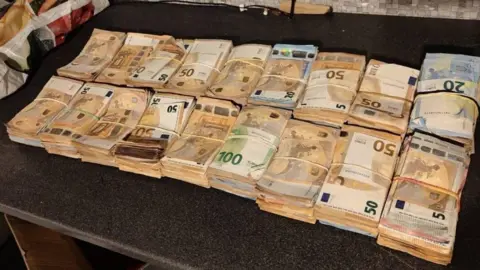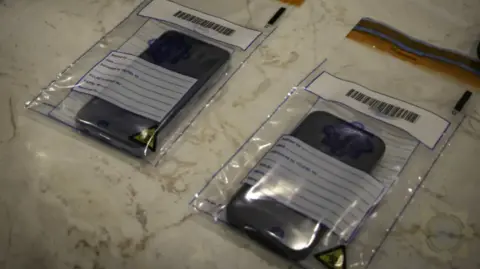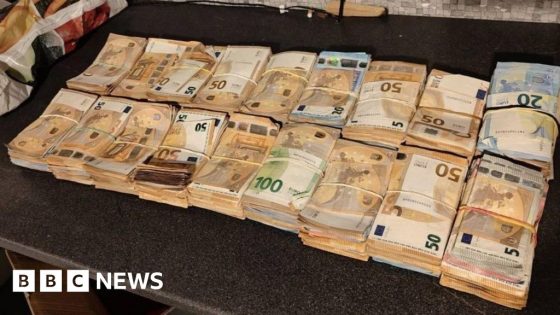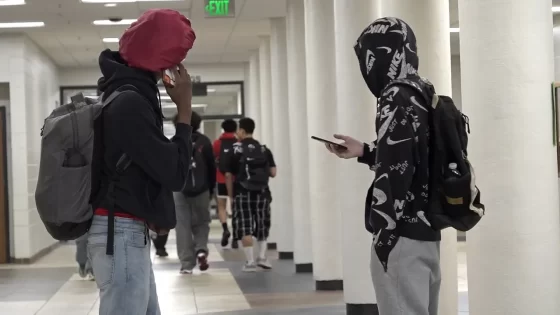 An Garda Síochána
An Garda SíochánaMore than 50 people have been arrested as part of a major international investigation which dismantled an encrypted communication platform.
The platform, known as Ghost, was used to facilitate a wide range of criminal activities, including large-scale drug trafficking, money laundering, instances of extreme violence and other forms of serious and organised crime.
Europol and Eurojust, together with international law enforcement, worked together to carry out the operation.
Over the course of the investigation, 51 suspects were arrested, including 38 in Australia, 11 in Ireland, one in Canada and one in Italy belonging to the Italian Sacra Corona Unita mafia group.
Europol also said a number of threats to life were prevented and a drug laboratory in Australia was dismantled.
Weapons, drugs and over €1m (£842,270) in cash were also seized globally so far, the body added.
Ireland’s day of action
In Ireland, Gardaí (Irish police) seized a total of €15.2m (£12.8m) worth of cocaine and 42 suspected encrypted devices.
They had been investigating four identified organised crime groups and support networks based in the Dublin and eastern region.
On Monday, more than 300 gardaí searched 27 premises.
Representatives from Europol, Australian Federal Police and the US Federal Bureau of Investigation were also in Ireland in support of the ongoing operation.
During these searches, investigating gardaí seized:
- €300,000 (£252,795) in cash
- Two cryptocurrency keys (contents under investigation)
- 42 suspected Ghost ECC encrypted devices
- 126 other mobile devices
- 27 laptops
- 200 plus SIM cards
- Six Rolex watches
- One 2021 Range Rover Jeep
They also intercepted an articulated truck in the south-east of the country on Monday.
Following a search of the truck, gardaí recovered 100kg of cocaine in a deep concealment.
This cocaine, subject to analysis by Forensic Science Ireland, is valued at €7m (£5.8m).
Five men, aged in their 30s, 40s and 50s, have been arrested in relation to this part of the operation.
 Getty Images
Getty ImagesWhat is the Ghost platform?
In a statement on Wednesday, An Garda Síochána said the Ghost platform had gained traction among criminal organisations due to its advanced security features.
Users could purchase the solution without any personal information.
The solution used three encryption standards and offered the option to send a message followed by a specific code that results in self-destruction of all messages on the target phone.
This allowed criminal networks to communicate securely, evade detection, counter forensic measures, and coordinate their illegal operations across borders.
Worldwide, several thousands of individuals used the tool, which has its own infrastructure and applications with a network of resellers based in several countries.
On a global scale, around a thousand messages are being exchanged each day via Ghost.
As servers were found in France and Iceland, the company owners were located in Australia, and financial assets were located in the United States, a global operation against the phone service started.
Further arrests to the 51 already made are anticipated in the global investigation.
 Europol
Europol‘They know no boundaries’
Europol’s executive director Catherine De Bolle said that the organisation has “made it clear that no matter how hidden criminal networks think they are, they can’t evade our collective effort”.
“Law enforcement from nine countries, together with Europol, have dismantled a tool which was a lifeline for serious organised crime,” Ms De Bolle said.
Speaking at Europol Headquarters in The Hague, An Garda Síochána Assistant Commissioner Justin Kelly, said his officers’ involvement “demonstrates Ireland’s ongoing commitment and capacity to operate at an international level targeting transnational organised crime groups which cause so much harm and misery not just in Ireland but in countries across the world”.
“Transnational organised crime group networks know no boundaries and do not respect any international borders or rules of law,” he said.
“It takes a network to defeat a network and today’s announcement is clear indication of the power of law enforcement networks in degrading and dismantling the activities of these criminal networks.”
When asked, on BBC Radio Ulster’s Evening Extra programme, about how Northern Ireland may be affected by this Justin Kelly said ”So far our investigations have only identified four criminal organisations all of which are based between Dublin and the east coast of Ireland and the network facilitators are all based in the Dublin area.”
“The fact such devices have not surfaced in the UK or NI is something to be thankful for, as there is no doubt they would have appeared very shortly,” he added.
In terms of these crimes extending into NI and the rest of the UK, he said the activity would “definitely” impact NI.
”People involved in drug trafficking don’t recognise any borders…drug trafficking does occur on an all-island basis. Drugs will be imported through NI for the southern market just as much as they’re imported through Ireland for the NI market.”
Source Agencies




